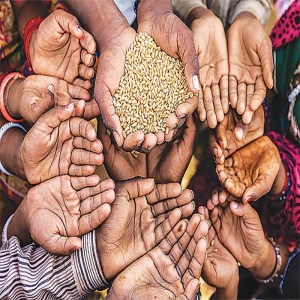
.jpg) Dr. M. D. Thomas
Dr. M. D. Thomas

The Global Hunger Index 2023, released on 19 October, places India in the 111th rank out of 125 countries. The International Food Policy Research Institute (IFPRI) calculates the index.
Belarus, Bosnia and Herzegovina, Chile, and China are among the top-ranked countries with low levels of hunger. Yemen, Madagascar, Central African Republic, and the like secure the bottom lines. Even neighbouring countries are far ahead of India.
Global Hunger Index is designed to raise awareness and understanding of regional and country differences. The index is expected to set off action to reduce hunger around the world on the global, regional and national levels.
The global average score, as per GHI 2023, is 18.3, less than one point below the score of 19.1 in 2015, a minimal difference. Progress on hunger is essentially stalled.
Sustainable Development Goal 2 is committed to creating a world free of hunger by 2030. It is already halfway through its goals. However, there has been an alarming increase in hunger and food insecurity since 2015.
Global Hunger Index points toward 43 countries at a ‘serious or alarming stage’ regarding hunger. The situation is so worrying that they are not even expected to reach the point of ‘low hunger’ by 2030, much less zero hunger. Unfortunately, India is one of these countries.
Undernourished people across the globe increased from about 572 million in 2017 to about 735 million. Millions go to bed hungry every night. There is a dire need to ensure the right to food and to fight against hunger.
Low caloric intake causing undernourishment is a significant indicator of hunger measurement. Low height and weight of children under five reflects chronic undernutrition. Children who die before they reach five years of age indicate a fatal mix of inadequate nutrition and unhealthy environments.
The current food systems have proven unsustainable, inequitable, non-inclusive and vulnerable to environmental degradation. These food systems cannot provide everyone with sufficient nutritious food, even at the most basic level.
With one of the most extensive youth populaces today, young people, along with children and women, are likely to be graver victims of poverty and food insecurity. The recent pandemic has left many unemployed and insecure as to their future, as well.
It must not be forgotten that the numbers and figures regarding the hunger index refer to the terrible human realities behind them. Besides, millions of people live on the edge of hunger because of past failures in making equitable, resilient and inclusive food systems.
On the 111th position India has secured out of 125 countries in the Global Hunger Index 2023, Swadeshi Jagran Manch has termed the report ‘mischievous’ and ‘mala fide intention’. The comment highlights the criminal intentions of the Manch.
It may be recalled that the government of India decided to provide free rations to 81.35 crore poor people under the National Food Security Act for one year. The decision came following the Pradhan Mantri Garib Kalyan Yojana, which ended on 31 December 2022.
According to the Median Poverty Line of the World Bank, over 60 per cent of the people in India live on some 3 dollars (around Rs 250) daily, and more than 21 per cent survive on less than 2 dollars (about Rs 160) daily. Over the years, the rich have become more affluent, and the poor have mostly stayed poor, thus widening the gap.
According to a report published by Oxfam in 2017, an international confederation of agencies fighting poverty, the wealthiest 10 per cent in India controls 80 per cent of the nation's wealth. The top 1 per cent also owns 58 per cent of the nation's wealth.
To put it in perspective, the wealth of 16 people in India equals 600 million. Seventy-five per cent of the people still live in villages. Some 35 per cent cannot read and write. Nearly 20 crores live in slums, on roadsides streets, under bridges and flyovers, struggling to make ends meet.
According to the United Nations, India has become the most populous nation globally, surpassing China. Some 415 million people in India could cross the line that demarcates poverty within 15 years, from 2005-06 to 2019-21. This poverty reduction, though remarkable, is too scanty in the bigger perspective.
The problem in India is not only hunger but also poverty. Poverty would mean insufficient money to meet basic needs, including food, clothing and shelter. It overarches many categories, including material and non-material, health, education, and employment.
In addition, economic development has been low in India. There has been a steady rise in prices within the country. The vast divide between requirement and availability of goods and services adds to the burden of low-income people.
According to the report published by Niti Aayog on 21 July 2023, though 13.5 crore people escaped poverty, 74.1 per cent of Indians still struggle to afford healthy food. A staggering 100 crore people are compelled by their circumstances to consume food with insufficient nutrition.
On the other hand, it is too shocking to see the cream of the country heartlessly wasting food in restaurants and at home. Will those responsible for this waste ever realise that an unfortunate lot is impoverished and hungry on the other side of their palatial walls?
Significant measures must be taken to reduce the disparity between the haves and have-nots of the country. The filthy rich must be instructed to share their riches with the poor and the hungry. Governments and responsible people have to ensure equitable justice of the resources for one and all.
--------------------------------------------------------------------------------------------------------------------------------
The author is the Director of the Institute of Harmony and Peace Studies, New Delhi, and has been committed to cross-cultural perspectives, cross-scriptural values, constitutional values, interfaith relations, social ethics, communal harmony, national integration and social well-being for over 40 years. He pursues the above mission through lectures, articles, books, messages, video messages, conferences, social interactions, views on TV channels, etc. He could be contacted at ‘mdthomas53@gmail.com’.